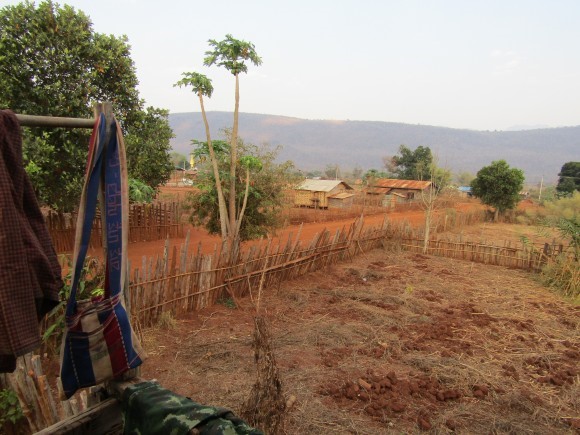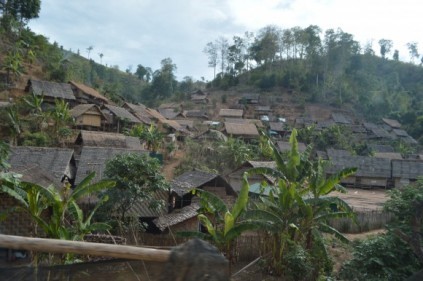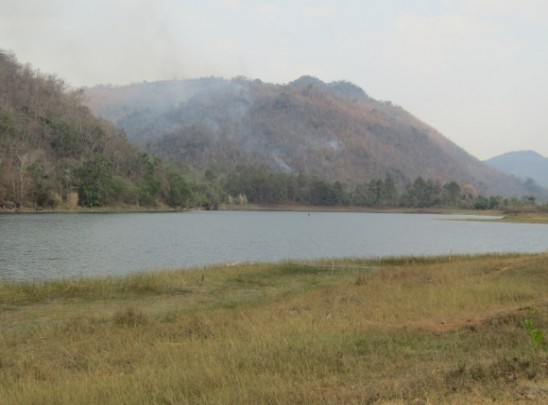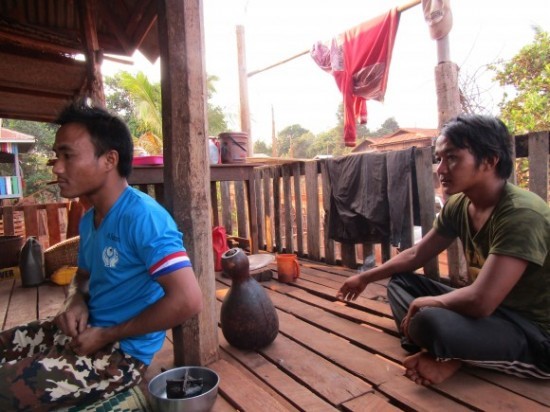A former Burmese refugee, graduated from ACTED’s training and now an electronics shop owner, brings us back to his village and to the troubled history of South-East Myanmar.

A village not quite like the others
Nested in the green, lush mountains by the border, Ban Mai Nai Soi looks like one of those thriving villages scattered around North-East Thailand, where traditional practices – construction, dresses and craftwork – and modern amenities such as smartphones, motorbikes and t-shirts of F.C. Barcelona live together in harmony and attract a growing attention from tourists.
In Ban Mai Nai Soi, the wooden stalls of the shops line the few, sometimes paved roads that a 4WD can take and the many lanes and narrow passages; kids play football after school; people live their lives.
An unusual number of signs, banners and posters of NGOs and UN agencies scattered around, signal that this is not a usual village. It is what is usually called a “temporary shelter”, actually a 30-something years old “temporary shelter”.
Ban Mai Nai Soi, known also as Site 1, is a refugee camp, but it doesn’t look like one. Tarpaulins are rare and well hidden under the rooves of dried leaves. Vegetation is abundant and every suitable plot of land is planted, no matter how small and close to the bamboo houses or hanging to a steep slope.
Like eight other camps along the Thai-Myanmar border, this unusual refugee camp hosts unusual people. In Site 1, it is mainly Karenni people, former inhabitants of Myanmar’s Kayah State, on the other side of the border, who had to flee the violence during a decades-long, little known, ruthless conflict that has been calming down since 2014.
Until recently, Poe Thar used to be one these unusual refugees.
We meet him at his shop, in the outskirts of Loikaw, the capital of Kayah State, to check on him about six months after the last time that we had met him. He greets us with a smile, standing proud behind the neat counter displaying smartphones and tablets.
The road to the Seven Lakes
While we move South-East by car towards the Seven Lakes and the mountains beyond them, Poe Thar, Aka Soe Naing Win, in Burmese, tells his story, pausing sometimes to look at the approaching mountains or to ask the translation of some words to my colleagues.

We are going to see his family, who lives in a village on the other side of the mountains, by the Thanlyn River. Not before joining a few visitors in a selfies session by one of the lakes, of course.
The place is beautiful, in fact: barren hills covered in grass, with green and blue lakes (seven, to be precise) scattered around, some of them lined with willows, others alive with giant lotus leaves. Now that the area is accessible, tourism is growing fast and Loikaw is now presented also in the Lonely Planet guide. Starting from a decades-long isolation, numbers are still limited and those who end up here tend to be adventurous and curious people; these factors are currently allowing to set up some interesting community-based tourism initiatives, orienting Loikaw towards being a prime destination for cultural and naturalistic tourism, mixed with internal and regional religious tourism to some remarkable temples.
If only that border crossing, not far from Ban Mai Nai Soi, were open. Well, and if only the road from Loikaw to Mae Hong Son were not a patchwork of unpaved tracks, boats over the mighty Salween River and a thinly paved, and often pot-holed, mountain road.
If it were not for these details Loikaw would rapidly become part of tourist circuits spanning from the Thai North-West and Laos; trade would also profit both sides of the border, with the typical spill-over effect of the border economies.
Of past and present fires
We leave the Seven Lakes behind us, and start climbing over the Dawna Range, in front of us. A beaten down wooden hut with a dusty Karenni flag and a sleepy guy on an hammock mark the entrance into the territory of the KNPP, the Karenni National Progressive Party, one of the non-state actors participating in the conflict.
The war.
My colleague shivers when he thinks about those times. Poe Thar directly experienced it when he was a teenager. We reach the mountain pass and his sharp eyes look at the densely forested mountaintops and then at me. “This was the front-line.”
With the conflict, many villages got burnt and looted. Young kids like Poe Thar at that time would be forced to carry food supplies away from their villages on behalf of their attackers.
While the car gently rolls down the serpentine road, the faint smell of smoke we had been experiencing since Loikaw gets thicker.
“Somehow it’s beautiful, terrible but beautiful,” says Poe Thar, pointing at the other side of the valley. Flames flash here and there in the midst of the forest. Small plots of land have been at first cleared of the older trees, then the remaining vegetation has been set afire. We are in March, the driest month of the year, just before the rainy season, and the yellowish, thirsty grass and bushes burn like matches under the clouded sky. They call it “slash and burn” agriculture.

Borrowing from development jargon, we might say that it’s a short-sighted livelihood strategy, but still a livelihood strategy that most of the landless farmers use to sustain themselves and their families. In Thailand they are gaining some ground in convincing farmers that there are other ways; here the work has just started and priorities are elsewhere.
Apart from the often occurring risk of losing control of the fire: “It’s easy to spot,” says Poe Thar while we pass an ash-covered portion of the forest, with the lowest branches of the pines blackened and crippled. “See? Here they didn’t cut the trees. This is a spill-over fire.”
Apart from the smoke that in some days covers all the land spanning from Mae Hong Son to Loikaw to the Chinese border. They call it “the haze” and, sometimes, it is so thick that it prevents planes from landing.
Apart from the erosion, the loss of fauna and pristine forests, the sight is somehow beautiful, almost stunning as the sun goes down and the fires start shining in the shadows.
Seizing opportunities
The car gets into a wider valley, filled with rice fields and gardens, with occasional water buffalos raising their head from the swampy riverside. As we approach Poe Thar’s village, he takes out his phone and starts checking and sending messages.
He looks up and smiles. The road is almost complete and you can see that they are working on it: some potholes and some unfinished parts, but generally well paved where most needed, on the mountain. We even cross a group of Burmese workers sweating in the sweltering sun to lay down the tarmac without any machine and with almost no tools, apart from a battered down barrel, fuming with tar, some shovels and a few wooden rods.
Then he shows me again his phone. 3G signal and a passable road now reach this remote village. “They arrived even before electricity but now we have it as well.”
Phone, 3G signal and roads: these are three crucial drivers of development, as they make people able to stay in touch with each other, expand their markets and access essential services such as higher education and hospitals in reasonable time.
For Poe Thar, this is also a huge business opportunity.
Before the road was constructed, before the GSM, before the fighting was over, it wasn’t easy to get an education if you came from this side of the mountain. So Poe Thar said goodbye to his family and ventured east of the Salween River, looking for opportunities.
A young, cunning man, wiser than his age would suggest, he didn’t wait for the luck to come but shaped his own luck the way so many migrants, in so many contexts, do: rely on, and build upon, his network.
So a young Poe Thar, freshly arrived in Mae Hong Son, hears from some Karenni friends of friends of his family living there that there is a refugee camp by the border, close to the village of Nai Soi. Given his situation, he was entitled to be one of the last Karenni refugees registered by UNHCR to access the boarding house, the food support and the community college.
He didn’t sit on them, he put his mind and heart into learning and came out from college already prepared to stay there and become a teacher himself.
In the meanwhile, he knew that the camp did not offer only formal education and that it would have been a waste of time and luck not to attend and pay attention to the English classes offered by one NGO, the “youth capacity building” workshops of another, the community meetings in the sections and in the KnRC, the Karenni Refugee Committee.
So was it for the vocational training that ACTED was offering. He had seen closely for some time the various classes hosted under the thatched rooves of the compound that ACTED shares with the Karenni Education Department. Poe Thar enrolled in the computer course and received his graduation certificate from the hands of the Director of Nawamin Industrial College. Nawamin College is the Vocational Training College that, together with other Vocational Training Colleges throughout Thailand, has been working for years with ACTED, with the support from the Bangkok-based Office of the Vocational Education Commission (OVEC), to design trainings that could be both relevant and feasible in the camps and to train those people living in the camps with a good potential for becoming trainers themselves.
Thanks to his results and positive attitude, Poe Thar was one of the graduates that ACTED selected to become a trainer, after spending almost two months learning from the teachers at Nawamin College.
Back to Loikaw
Confident in his role and in his skills, Poe Thar one day went on a visit to Loikaw. The town was thriving, with many buildings under construction and much more shops than the last time he went there, a long time before. After some temporary work in a computer shop, Poe Thar went back to the camp.
Yes, it was good to be back, to see the friends and keep on passing his own knowledge to other people, but what he had seen in Loikaw, not to speak about the frank talks he had with the shop-owner who hosted him during his staying, told him that the opportunity, this time, was waiting for him back in Myanmar.
A full time seven days a week job. Long hours but also the satisfaction of a comfortable life, of a reliable access to internet, of a city to rediscover and of a family to visit, from time to time.
Also, and maybe more important, the opportunity of greatly improving his skills in repairing and setting up smartphones and computers, profiting from the experience of the shop owner but also thanks to his ability in searching internet for information, compounded with his good understanding of the English language.
At 24, he managed to convince his older brother, who had saved a little capital, to invest in him and in his idea of opening an electronics shop just outside Loikaw, on the main road towards the South.
We go past a shining temple, past the water-tanks built by one NGO and we park by Poe Thar’s family house. We drink tea and khawn, a warm home-made mildly alcoholic rice wine, and munch on dried fruits and nuts chatting about the village, while his younger brother is immersed in the smartphone.

“Guess how many people in this village know how to download an app or sign in on Facebook?” Poe Thar smiles. “And guess how many of them want to have Facebook or Skype, now that the 3G arrived here?”
It is the kind of services that he actually does free of charge, as a contribution to the community but also as a marketing strategy.
“The phones around here get broken all the time. They got straight from the little, indestructible Nokia lost somewhere that nobody could really use inside the village, to the touch screens. And of course they call me to fix their phones.”
The night comes over the Karenni lands as we navigate through a herd of cows and goats and then back towards Loikaw and the Demaso market with its colourful cell phones and lighted food stalls. As I doze off, I see Poe Thar computing on his phone with a smile dancing on his face.
Later that night, once back under the hotel Wi-Fi, I would receive his Facebook invitation.
